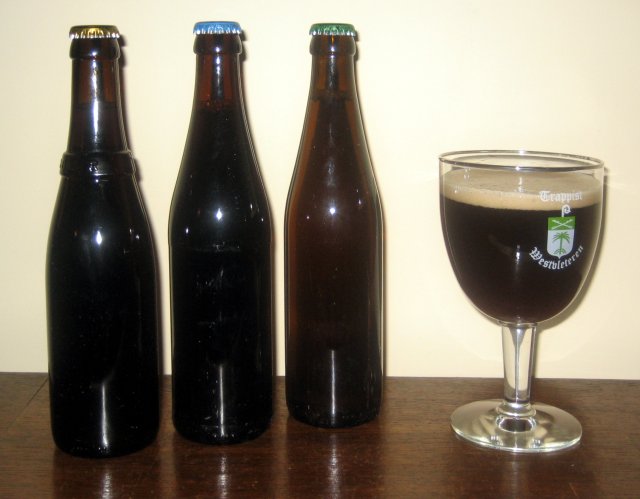Tastes Great, Can’t Buy It

Ask a community of beer aficionados which beer is the best, and chances are they’re not going to shoot back with Pabst Blue Ribbon or Milwaukee’s Best. Ask BeerAdvocate.com and you’ll get a top two of Pliny the Younger, a Californian brew, or Westvleteren 12. Go to RateBeer.com and you’ll see a similar name in that top spot, as Westvleteren 12 makes a repeat appearance. (Pliny the Younger comes it at #7.) Both rating sites give Westvleteran a 100, their highest possible scores.
But buying a bottle of Westvleteren 12? That’s a bit tricky.
The Belgian municipality of Vleteren is in the northwestern part of the country, closer to both the North Sea and the French border than it is to Brussels. (Here’s a map.) Roughly 3,500 Belgians live in the area, about two dozen of whom are Trappists, an order of monks, who live at St. Sixtus’ Abbey. Ten of these monks, with the help of three secular employees, make Westvleteren 12 (the yellow-capped bottle pictured above) and two other types of beer. But buying Westveletern 12 is hard because the monks produce so little of it. The monks brew beer for only about 10 weeks a year, eschewing any desire to increase production. And they produce only 125,000 gallons (475,000 liters) of beer per year across all three beer types. That results in about 15,000 to 25,000 cases of Westvleteren 12.
The brewery, which has been around in some capacity since 1838 (but was upgraded two decades ago), was originally established to fund the construction and completion of the abbey itself. According to the Independent, the monks started brewing beer because “the workers who built the monastery were entitled to two glasses of beer a day,” and crafting it themselves seemed like a good way to pay the bills. Today, the brewery is the main source of revenue for the Trappist monks at St. Sixtus’. But, given the limited production of the beer, the brewery is obviously not a traditional business. This is by design. As the Father Abbot stated when the new brewery opened in 1992 (as recapped on the Abbey’s website):
This must be strange for business people and difficult to understand that we do not exploit our commercial assets as much as we can. We are no brewers. We are monks. We brew beer to be able to afford being monks.”
The monks sell 24 bottle cases of the beer for about $35, or $1.50 a bottle. The low price point combined with the scarcity drives the first-come, first-served demand to a fever pitch. Customers can find out when the beer goes on sale by calling a hotline colloquially referred to as the “beer phone,” but, as USA Today reports, the lines get crazy, and quickly:
On the first day the beer goes on sale, cars start lining up at the abbey at 5:15 a.m., says Brother Joris. The gates open at 10 a.m., and buyers are limited to two cases per car. “Not to be resold” is stamped on the receipts, but customers regularly disregard the monks’ wish, and the coveted beer is exported, unlabeled and without permission, to America and elsewhere.
And reselling is a very profitable endeavor. The beer can easily fetch prices north of $15 per bottle, ten times what the monks themselves sell it at. The monks have tried to limit resellers — per the Wall Street Journal, often it takes nothing more than an email asking resellers to cease doing so — but there are always some out there unwilling to cooperate. One site, BelgianBeer.com, currently resells the bottles at $40 a pop, for example.
Better than waiting in line, at least.
Bonus fact: A fraternity is not a monastery. That may seem obvious, but it was the topic of a recent case in Illinois. A Chicago homeowner wanted to rent his house to the Loyola University chapter of the Sigma Chi fraternity, but area zoning laws disallowed such a rental. There was an exception available, however, for monasteries, convents, and the like. The homeowner brought an action against the city claiming that the fraternity members took an oath — “in the Service of God and Man” — and were, therefore, a religious group analogous to monks in a monastery. The court (decision here, pdf, via Volokh Conspiracy) disagreed.
From the Archives: Scrambled City: A Belgian town which is part Dutch. And vice versa.
Related: You can’t buy Westvleteren 12 on Amazon, but there’s a book (“Brew Like a Monk“) which purportedly discusses some of their secrets. 35 reviews, 4.6 stars.

Leave a comment